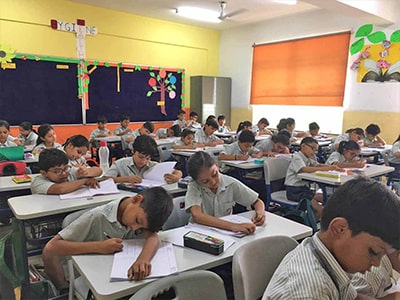Download our FREE Academic Calendar now! 📚 Start your child’s journey to success.
A question that most often arises in a child’s mind is, how do they distinguish between right and wrong? They must also wonder if what they do is good or bad. Finding answers to such questions is difficult for children as they are too young to know the difference.
Therefore, it is important that they be taught from the very earliest the important moral values that will guide them throughout their lives. Values will help them make the right decisions and save them from making mistakes that could harm them or the people around them.
What are Moral Values?
Moral values are the essential elements of human character. They are the attributes that guide us on this journey called life. They help us make the right decisions, distinguish between good and evil, and make the right judgments when faced with a tricky situation or dealing with difficult people.
Moral values are instilled in us right in our childhood by our parents and the elders at home.
We learn more about them and how they affect our lives in school and college. These moral values play an important part in our lives, help us be better human beings, and save us from making rash judgments or decisions.
Why are Moral Values Important for Students and Children?
Children are the most vulnerable members of our society. Not only are they inexperienced, but also unprepared to make decisions for themselves or decipher the good from the bad.
Furthermore, as students, they are constantly faced with challenges, be it at school or at home, amongst family or friends. To be able to navigate this journey full of challenges, it is crucial that they know the importance of moral values.
How Do Moral Values Help Students?
● It will help them grow into empathic, understanding, and well-balanced adults.
● Moral values will help them build a strong character that exudes positivity, compassion, kindness, and honesty.
● They will learn to think before reaching conclusions, and thus make the right decisions and choices.
● Teaching moral values to kids at a young age will help shape their attitudes and beliefs towards life and the people around them.
● Developing a positive character trait will help boost their confidence, which will help them when faced with tough situations.
● Moral values will also encourage children to follow the path of righteousness and thus live a life of dignity. It will help them earn the respect and admiration of their fellow students and other members of society.
● Thoughts on moral values will help children and students use their energy in a positive manner.
● Knowing the difference between right and wrong will help them stay away from any negative influence from their peers or society.
● And, finally, developing the right values will help them become responsible citizens of their future. It will further encourage them to create an ideal society that believes in peace and harmony.
Moral values, when taught during childhood, stay with children for life. It is therefore essential that schools make it an important part of their curriculum to inculcate these values in their students. Parents do impart the right values to children, but many children fail to receive this guidance, which leads them astray by the negative influences around them.
10 Moral Values For Students
Teaching the following moral values to students and children will help them grow into confident and righteous adult members of society.
1. Honesty
Honesty is an important value to teach students. It helps them distinguish it from dishonesty which leads to failure. Knowing the importance of being honest while appearing for an examination will prevent them from cheating or following immoral ways to pass.
Learning about the repercussions of being dishonest will help them understand how this negative trait can follow them in the long run and affect their entire career.
2. Kindness
Today, the world needs kindness to survive the storms that threaten to disrupt peace at every turn. Students must be taught how being kind will help spread peace and create a sense of brotherhood amongst all. It will replace cruelty and make our society a better place to live in.
3. Respect for All
Kindness is followed by respect, a trait that helps us cherish our relationships and embrace each other’s differences. Respect for every religion, race, caste, gender, and lifestyle helps one develop tolerance. It also helps us succeed as a species.
4. Compassion
Kindness and respect lead to compassion. Compassion for every living being, be it man or animal, leads to a peaceful society. Being compassionate towards those who are less fortunate will teach students to be more helpful towards them. It will help them work towards removing problems, such as poverty and illiteracy, from our society.
5. Forgiveness
Instilling the importance of forgiveness will make way for a world without violence and unrest. Our religious scriptures teach us about the need to forgive those who hurt us or treat us wrongly. However, we seldom practice this virtue in our everyday lives. Teaching the moral value of kindness to primary students will lead to fewer fights and disagreements between the young students.
6. Cooperation
Children learn all about cooperation at home when they collaborate with their family members to fulfill their common goals. Doing household chores together or helping their parents in completing the tasks helps children learn to lend a helping hand to those who need them.
It also teaches them to become better listeners who understand the needs of others and help them solve their problems.
7. Sharing
This is an important moral value that is introduced in preschool. Sharing their belongings with the children who don’t have those things, helps children grow into selfless human beings. Younger children can be encouraged to share things like books, toys, clothes, and food with less fortunate children. It goes a long way in making them empathetic, caring, and understanding.
8. Empathy
Being able to understand other people’s problems is empathy. It is akin to putting oneself in another person’s shoes and understanding the difficulties they may face in life. Teaching children the importance of being empathetic helps them grow into better human beings. It can help transform our society into a peaceful haven for all.
9. Equality
Treating everyone with respect and equality in terms of rights and opportunities helps society grow into a liberal, unbiased community. Elders can help instill this moral value by encouraging children to play along with other children, regardless of their differences.
10. Courage
The readiness to tackle difficult situations is courage. This moral value is especially necessary for students of class 9 as they are almost on the threshold of a new life.
After secondary school, when they have to prepare for high school, examinations, and college admissions, students often lack confidence and courage. Teaching them to prepare themselves thoroughly and face the situation boldly will help them achieve success.
Besides this, older students also face issues such as bullying that can often get out of hand and hurt those involved. Teaching students to be courageous will help them stand up to the bully and save themselves from getting hurt.
Conclusion
The best school in Ahmedabad inculcates these moral values in their students through value education topics from the very beginning of their academic journey. Teachers instill these values through stories and moral value examples to help students understand their importance.
These moral values help students of the best high school develop their character and a positive attitude towards life. These values will go a long way in helping the youngsters grow into confident adults who strive to build a perfect community for all and make this world a better place.




































